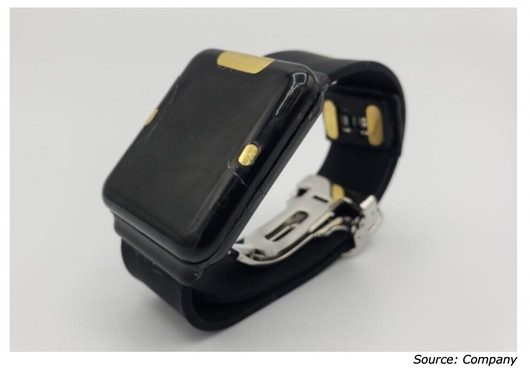Vertical Divider
Blood Glucose Readings to Be Added to Smart Watches
Samsung is expected to release three new smartwatches in the second half of 2021 and the Samsung Galaxy Watch 4 or the Samsung Galaxy Watch Active 3 will offer the blood glucose readings. The Apple Watch Series 7 will offer the same feature. The timepieces will use a technology called Raman spectroscopy. Using a laser light, this technology is able to determine the composition of a substance, such as the amount of glucose in a person's blood. There are also other applications for this technology that go beyond diabetics. Monitoring blood glucose levels could result in heavy demand for Apple and Samsung's new smartwatches. In the U.S., there are 25 million insulin dependent diabetics according to the World Health Organization (WHO); that number is rising thanks to the poor diet and lack of exercise that most Americans experience.
Figure 1: Non-invasive glucometer from Quantum Operation
Samsung is expected to release three new smartwatches in the second half of 2021 and the Samsung Galaxy Watch 4 or the Samsung Galaxy Watch Active 3 will offer the blood glucose readings. The Apple Watch Series 7 will offer the same feature. The timepieces will use a technology called Raman spectroscopy. Using a laser light, this technology is able to determine the composition of a substance, such as the amount of glucose in a person's blood. There are also other applications for this technology that go beyond diabetics. Monitoring blood glucose levels could result in heavy demand for Apple and Samsung's new smartwatches. In the U.S., there are 25 million insulin dependent diabetics according to the World Health Organization (WHO); that number is rising thanks to the poor diet and lack of exercise that most Americans experience.
Figure 1: Non-invasive glucometer from Quantum Operation
The reading must be precise since if it is off by even a small amount, the user could take an erroneous insulin dose. Too little insulin and the diabetic's blood sugar remains too high and could affect things like the user's eyesight. Too much insulin could cause a diabetic to suffer from hypoglycemia (low blood sugar) and pass out.
|
Contact Us
|
Barry Young
|

